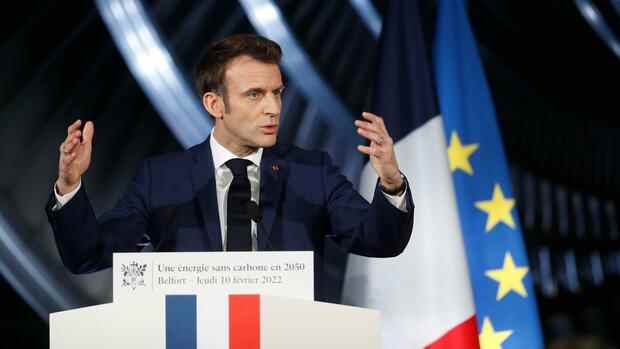Paris Two months before the French presidential election, Emmanuel Macron presented an energy strategy with massive investments in nuclear power. The head of state announced on Thursday that six new reactors would be built.
Construction of the next generation of pressurized water reactors (EPR 2) is scheduled to begin in 2028, with the first new reactors scheduled to go online in 2035. The state-controlled energy company EDF is also said to be examining the construction of eight more reactors.
While Germany is taking the last reactors off the grid this year, the French President is setting the course in a different direction: “In order to increase electricity production, we have to resume the great adventure of civil nuclear power in France in addition to renewable energies,” said Macron in Belfort in eastern France. In addition to the large reactors, mini nuclear power plants, so-called Small Modular Reactors (SMR), should also secure the energy supply in the long term.
The service life of the existing nuclear power plants is to be extended. “I would like that in the future no productive nuclear reactor will be shut down, except when safety conditions require it,” Macron said. The president wants the EDF group to check whether terms of more than 50 years instead of the previous 40 years are possible.
Top jobs of the day
Find the best jobs now and
be notified by email.
The president, who has to defend his office in April, also wants to expand renewable energy. 50 offshore wind farms with a capacity of 40 gigawatts are to be built off the French coast by 2050. The government also wants to speed up the construction of wind farms on land.
Macron’s change of heart
But nuclear power remains a central pillar of energy policy for France in this century. Around 70 percent of the power supply in the neighboring country comes from nuclear energy.
At the beginning of his term, Macron wanted to phase out nuclear power and close a number of power plants by 2025. The deadline has been pushed back to 2035 – a first sign of the president’s change of heart. In December 2020, Macron then made himself clear in a speech: In addition to renewable energies, the future also lies in nuclear power.
The President chose a factory that produces turbines for nuclear power plants as the venue for announcing his energy strategy. The site had belonged to the US company General Electric, which sold the business to EDF.
The deal has a strategic dimension for Paris: The turbines from the plant that General Electric took over from the French Alstom group in 2015 are used in all of the country’s nuclear power plants. After the deal was announced on Thursday, EDF boss Jean-Bernard Lévy said the group was strengthening its “key technologies and skills for the current nuclear power plant and for new nuclear projects in France and worldwide” with the turbine business.
In the EU, France has managed to get nuclear power classified as sustainable energy in the green investment rules. German resistance to the inclusion of atomic energy in the so-called taxonomy was unsuccessful.
More on the subject:
The day before Macron’s speech, Federal Minister of Economics Robert Habeck had teased the neighboring country: “What France is doing at the moment is a very planned, capped energy supply for an old-fashioned industry.” The numerous old nuclear power plants would be more prone to failure and would have to be renovated at great expense.
Investments in new reactors did not pay off because of the high costs and delays. Germany’s focus on renewable energy will be a location advantage for the German economy.
Indeed, France is struggling to complete its first EPR pressurized water reactor. The prestige project in Flamanville in the northwest of the country is now a decade behind schedule, and costs have almost quadrupled. In January, EDF announced that the construction of the new nuclear power plant would be even more expensive and would be finished even later. The state-controlled group now expects construction costs of 12.7 billion euros and commissioning in the course of the second quarter of 2023.
With his announcement in Belfort, however, Macron made it clear that the government still firmly believes in the technology. Behind France’s bet on nuclear power is the assessment that turning away from fossil fuels and decarbonising the economy by 2050 cannot be achieved with renewables alone. In the Élysée, it is said that the demand for electricity will increase massively when more and more electric cars are on the roads and hydrogen has to be produced for industry.
People in Paris like to point out that the current energy mix is much lower in emissions than in Germany thanks to nuclear power. Last year, coal was the most important energy source for electricity generation in the Federal Republic, and the proportion has even increased recently. Germany’s dependence on Russian gas is also viewed critically in France, particularly against the background of the escalation of the Ukraine conflict.
Macron under pressure
Nuclear power plays an important role in the French election campaign. Macron, who is expected to officially announce his candidacy for a second term in the next few weeks, is primarily under pressure on this issue from right-wing candidates Marine Le Pen and Éric Zemmour.
Instead of expanding wind and solar energy, they demand an even stronger nuclear orientation. According to surveys, the majority of the French population also supports nuclear power.
More: Do we need gas and nuclear power to achieve the climate goals? – The EU Commission says yes

